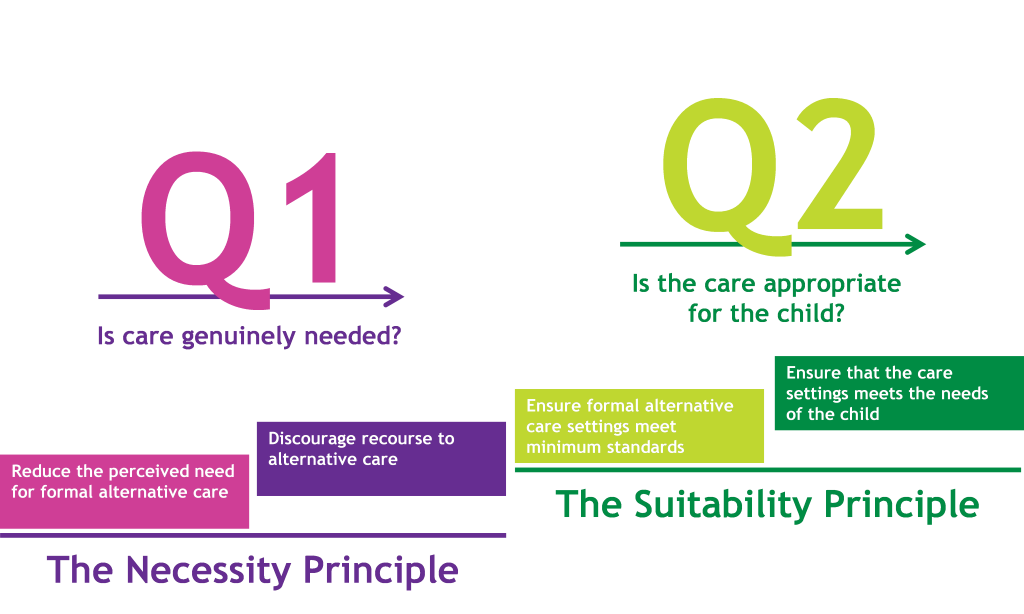
Overview of the Tool
Supporting the implementation of the Guidelines
The measuring tool has been developed to support actors and networks at the country level to assess how far they have progressed in the implementation of the Guidelines and to plan and measure progress towards full implementation. It builds on the guidance provided in ‘Moving Forward: Implementing the Guidelines for the Alternative Care of Children’.
The measuring tool aims to:
- be accessible, easy to use and relevant in diverse country contexts
- use data and evidence which are available in both qualitative and quantitative forms
- provide a consistent baseline of information on alternative care which can be updated and used for different purposes and at different times.
Basic principles of alternative care
The Guidelines take into account two basic principles in the provision of alternative care for children:
- The Necessity Principle: ensure that alternative care for any individual child is genuinely needed
- The Suitability Principle: ensure that alternative care is provided in an appropriate manner for an individual child.

Figure 1 Applying the principles of Necessity and Suitability. Taken from Moving Forward: Implementing the ‘Guidelines for the Alternative Care of Children’ p22-23.
These two principles - Necessity and Suitability- have been used to provide a framework for the measuring tool, underpinned by four overarching themes:
- Addressing the factors that may lead to the need for alternative care
- Discouraging the use of alternative care unless necessary
- Ensuring formal alternative care settings meet minimum standards
- Ensuring that formal alternative care settings meet the best interests of the individual child.
Sub themes explore the themes in more depth. At the end of each theme there are questions which require those using the tool to identify strengths in relation to the Guidelines and areas where further progress is required. A final section asks those completing the tool to identify their overarching strengths, challenges and next steps.
Overview
40 Questions
Theme 1
Addressing the factors that may lead to the need for any forms of alternative care
- Sub Theme 1. Supporting children and their families
- Sub Theme 2. Alternative care as part of a national framework
- Sub Theme 3. Financing care
- Sub Theme 4. Strengths and progress
Theme 2
Discouraging the use of formal alternative care unless necessary
- Sub Theme 1. Gatekeeping systems REF020
- Sub Theme 2. Assessment, planning and reviewing of placements REF031
- Sub Theme 3. Reintegration, leaving care and after care preparation and support
- Sub Theme 4. Informal care
- Sub Theme 5. Strengths and progress
Theme 3
Ensuring formal alternative care meets minimum standards
- Sub Theme 1. National standards
- Sub Theme 2. Human resources
- Sub Theme 3. Mandatory registration and authorisation systems
- Sub Theme 4. Inspection and oversight mechanisms
- Sub Theme 5. Strengths and progress
Theme 4
Ensuring that formal alternative care settings meet the best interests of the individual child
- Sub Theme 1. Formal alternative care options
- Sub Theme 2. Formal family-based alternative care
- Sub Theme 3. Residential care
- Sub Theme 4. De-institutionalising the alternative care system
- Sub Theme 5. Care for children outside their country of habitual residence
- Sub Theme 6. Care for children in emergency situations
- Sub Theme 7. Strengths and progress
In addition to the themes and sub-themes, Tracking Progress has taken account of six cross-cutting issues, which inform the questions at various points throughout the tool.
The six cross-cutting issues are:
- A commitment to international standards in line with international and regional human rights instruments e.g. Convention on the Rights of the Child (CRC); Convention on the Rights of Persons with Disabilities (CRPD); the African Charter on the Rights and Welfare of the Child (ACRWC)
- Children and families’ participation in all aspects of alternative care, including those children at risk of being placed in care
- Best interests of the child underpinning all planning and decisions on alternative care
- A commitment to the rights of children and their families who may be marginalised or discriminated against due to: disability (including carers who may be disabled); gender; religion; ethnic group, etc.
- The importance of taking into account stages of child development including those who are very young (under three years) and those who are moving on from care to young adulthood
- Availability of sufficient numbers of competent human resources (professionals, staff and carers) to support children and families.